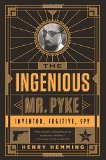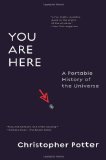Summary | Excerpt | Reviews | Beyond the book | Read-Alikes | Genres & Themes | Author Bio

His Life and Universe
by Walter IsaacsonIsaacson's impressively readable
biography of Einstein, the first to be published in
English since all Einstein's papers have been
available, lays some long held myths to rest.
Alas, contrary to popular believe (and rather sadly for
those of us who hang on to the believe that our
child who struggles with math in school might grow
up to be the next Einstein), young Albert, although
not popular with his teachers who he compared to
drill sergeants, was top of his class in primary
school and sufficiently competent at math to have
mastered calculus at the age of 15.
Also, the myth that the lowly patent clerk created
his world shattering theories in a vacuum is found
to be somewhat wanting. From an early age Einstein
received inspiration and support from family and
friends; his uncle, Jakob Einstein, was the first to
introduce him to the "merry science" of algebra
which Einstein happily embraced; and his book
shelves contained popular books of the day such as
the 21 volume Popular Books on Natural Science
by Aaron Bernstein (given to Albert by a family
friend at the age of 10). In the first volume, the
enthusiastic Bernstein (the Carl Sagan of his day)
describes a thought experiment in which a bullet is
fired at a passing train. For the gunner, the bullet
appears to fly straight, but for the passenger on
the train, the bullet appears to cut at an angle -
thus showing that motion is relative. From this and
other thought experiments Bernstein concludes that,
"Since each kind of light proves to be of exactly
the same speed, the law of the speed of light can
well be called the most general of all of nature's
laws." In another volume, Bernstein takes his
readers on an imaginary ride through space on an
electromagnetic wave; and goes on to speculate that
a scientific unity and simplicity lies beneath all
the concepts applied by our perceptions. Thus, seeds
were planted in the mind of young Albert that came
to fruit some years later.
Knowing that Einstein's early reading matter shaped
his later thinking should not in anyway demean his
extraordinary achievements, rather they illustrate
Louis Pasteur's well known quote, "Chance favors the
prepared mind". Many others had access to the same
basic information as Einstein but it was he who made
the mental leaps recorded in his four world-changing
papers in 1905.
Einstein comes across as fully man, not myth,
replete with complexities and contradictions. A man
to be admired as a scientist but not necessarily as
a human being. He was emotionally cold, regarding
his two wives as caretakers responsible for his
every need, and treated his children badly. He was a
loner but also loved the celebrity status he was
given in the USA. As a young man he despised
nationalism to such an extent that, at the age of
17, he renounced his German citizenship and, for a
time, became stateless; but he later became an
enthusiastic Zionist and patriotic American. In his
youth he was a revolutionary thinker but his
thinking became increasingly conservative as he
passed forty. He gradually lost touch with the
cutting edge of physics as he tried to rationalize
the painful paradox that he had uncovered - that,
while he personally believed in an ordered universe
of "harmony and beauty", his own research showed
only uncertainty, randomness and chance. So, while
he pioneered quantum mechanics, he refused to
believe it was a complete theory.
Reviewers agree that whether you are reading a
biography of Einstein for the first time or already
very familiar with his life, Isaacson's work has
something to offer. With the help of
Brian Greene
(author of The Elegant Universe etc) and
Nobel laureate Murray Gell-Mann, Isaacson makes neat
work explaining Einstein's theories without ever
resorting to an equation, thus making it a good
starting point for anybody wishing to explore
Einstein's life and work for the first time; and, by
dint of being one of the first to access recently
released materials, Isaacson also offers nuggets of
information that will be news even to Einstein
scholars.
![]() This review was originally published in The BookBrowse Review in May 2007, and has been updated for the
June 2008 edition.
Click here to go to this issue.
This review was originally published in The BookBrowse Review in May 2007, and has been updated for the
June 2008 edition.
Click here to go to this issue.

If you liked Einstein, try these:

by Henry Hemming
Published 2016
The untold story of an enigmatic genius who changed warfare forever.

by Christopher Potter
Published 2010
You Are Here is a dazzling exploration of the universe and our relationship to it, as seen through the lens of today's most cutting-edge scientific thinking.
Your guide toexceptional books
BookBrowse seeks out and recommends the best in contemporary fiction and nonfiction—books that not only engage and entertain but also deepen our understanding of ourselves and the world around us.